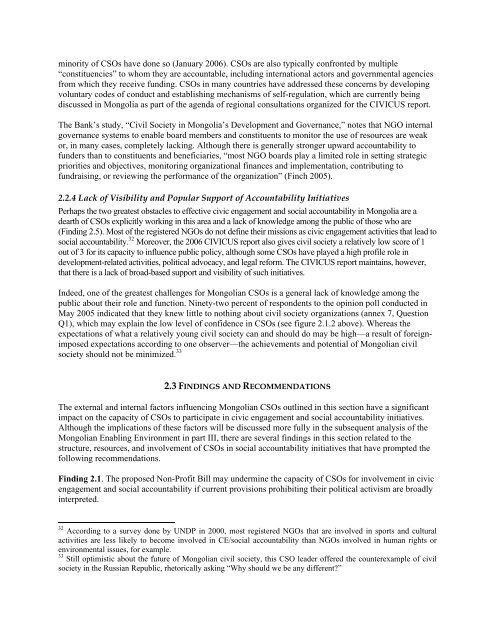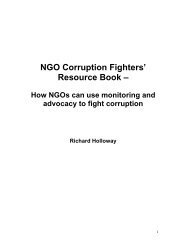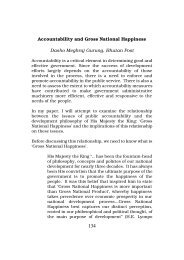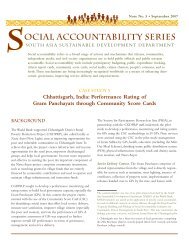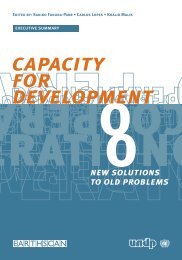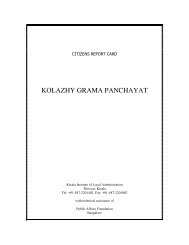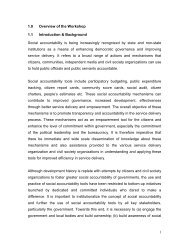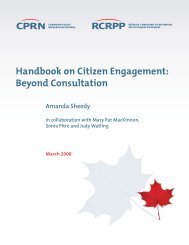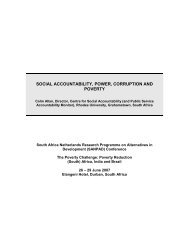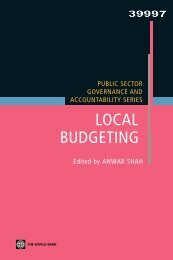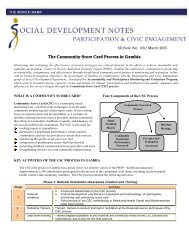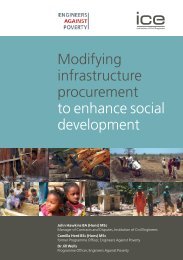Enabling Environment for Social Accountability in ... - SASANet
Enabling Environment for Social Accountability in ... - SASANet
Enabling Environment for Social Accountability in ... - SASANet
Create successful ePaper yourself
Turn your PDF publications into a flip-book with our unique Google optimized e-Paper software.
m<strong>in</strong>ority of CSOs have done so (January 2006). CSOs are also typically confronted by multiple<br />
“constituencies” to whom they are accountable, <strong>in</strong>clud<strong>in</strong>g <strong>in</strong>ternational actors and governmental agencies<br />
from which they receive fund<strong>in</strong>g. CSOs <strong>in</strong> many countries have addressed these concerns by develop<strong>in</strong>g<br />
voluntary codes of conduct and establish<strong>in</strong>g mechanisms of self-regulation, which are currently be<strong>in</strong>g<br />
discussed <strong>in</strong> Mongolia as part of the agenda of regional consultations organized <strong>for</strong> the CIVICUS report.<br />
The Bank’s study, “Civil Society <strong>in</strong> Mongolia’s Development and Governance,” notes that NGO <strong>in</strong>ternal<br />
governance systems to enable board members and constituents to monitor the use of resources are weak<br />
or, <strong>in</strong> many cases, completely lack<strong>in</strong>g. Although there is generally stronger upward accountability to<br />
funders than to constituents and beneficiaries, “most NGO boards play a limited role <strong>in</strong> sett<strong>in</strong>g strategic<br />
priorities and objectives, monitor<strong>in</strong>g organizational f<strong>in</strong>ances and implementation, contribut<strong>in</strong>g to<br />
fundrais<strong>in</strong>g, or review<strong>in</strong>g the per<strong>for</strong>mance of the organization” (F<strong>in</strong>ch 2005).<br />
2.2.4 Lack of Visibility and Popular Support of <strong>Accountability</strong> Initiatives<br />
Perhaps the two greatest obstacles to effective civic engagement and social accountability <strong>in</strong> Mongolia are a<br />
dearth of CSOs explicitly work<strong>in</strong>g <strong>in</strong> this area and a lack of knowledge among the public of those who are<br />
(F<strong>in</strong>d<strong>in</strong>g 2.5). Most of the registered NGOs do not def<strong>in</strong>e their missions as civic engagement activities that lead to<br />
social accountability. 32 Moreover, the 2006 CIVICUS report also gives civil society a relatively low score of 1<br />
out of 3 <strong>for</strong> its capacity to <strong>in</strong>fluence public policy, although some CSOs have played a high profile role <strong>in</strong><br />
development-related activities, political advocacy, and legal re<strong>for</strong>m. The CIVICUS report ma<strong>in</strong>ta<strong>in</strong>s, however,<br />
that there is a lack of broad-based support and visibility of such <strong>in</strong>itiatives.<br />
Indeed, one of the greatest challenges <strong>for</strong> Mongolian CSOs is a general lack of knowledge among the<br />
public about their role and function. N<strong>in</strong>ety-two percent of respondents to the op<strong>in</strong>ion poll conducted <strong>in</strong><br />
May 2005 <strong>in</strong>dicated that they knew little to noth<strong>in</strong>g about civil society organizations (annex 7, Question<br />
Q1), which may expla<strong>in</strong> the low level of confidence <strong>in</strong> CSOs (see figure 2.1.2 above). Whereas the<br />
expectations of what a relatively young civil society can and should do may be high—a result of <strong>for</strong>eignimposed<br />
expectations accord<strong>in</strong>g to one observer—the achievements and potential of Mongolian civil<br />
society should not be m<strong>in</strong>imized. 33<br />
2.3 FINDINGS AND RECOMMENDATIONS<br />
The external and <strong>in</strong>ternal factors <strong>in</strong>fluenc<strong>in</strong>g Mongolian CSOs outl<strong>in</strong>ed <strong>in</strong> this section have a significant<br />
impact on the capacity of CSOs to participate <strong>in</strong> civic engagement and social accountability <strong>in</strong>itiatives.<br />
Although the implications of these factors will be discussed more fully <strong>in</strong> the subsequent analysis of the<br />
Mongolian <strong>Enabl<strong>in</strong>g</strong> <strong>Environment</strong> <strong>in</strong> part III, there are several f<strong>in</strong>d<strong>in</strong>gs <strong>in</strong> this section related to the<br />
structure, resources, and <strong>in</strong>volvement of CSOs <strong>in</strong> social accountability <strong>in</strong>itiatives that have prompted the<br />
follow<strong>in</strong>g recommendations.<br />
F<strong>in</strong>d<strong>in</strong>g 2.1. The proposed Non-Profit Bill may underm<strong>in</strong>e the capacity of CSOs <strong>for</strong> <strong>in</strong>volvement <strong>in</strong> civic<br />
engagement and social accountability if current provisions prohibit<strong>in</strong>g their political activism are broadly<br />
<strong>in</strong>terpreted.<br />
32 Accord<strong>in</strong>g to a survey done by UNDP <strong>in</strong> 2000, most registered NGOs that are <strong>in</strong>volved <strong>in</strong> sports and cultural<br />
activities are less likely to become <strong>in</strong>volved <strong>in</strong> CE/social accountability than NGOs <strong>in</strong>volved <strong>in</strong> human rights or<br />
environmental issues, <strong>for</strong> example.<br />
33 Still optimistic about the future of Mongolian civil society, this CSO leader offered the counterexample of civil<br />
society <strong>in</strong> the Russian Republic, rhetorically ask<strong>in</strong>g “Why should we be any different?”


